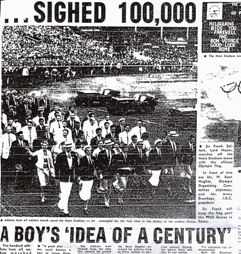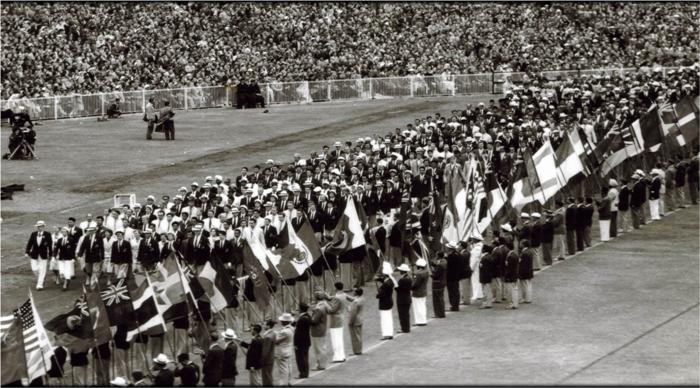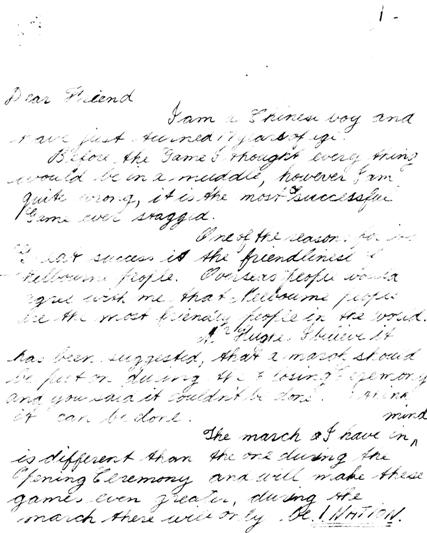"Dear Friend... I am a Chinese boy and just turned 17 years of age... I believe it has been suggested that a march should be put on during the closing ceremony and you said it could not be done. I think it can be done."
These were the optimistic opening lines of an anonymous letter, which was hand-posted to the Olympic committee in 1956, just days before the closing ceremony of the Melbourne Olympic Games. Riddled with the political backdrop of the Suez crises, China's conflict with Taiwan and Russia's invasion of Hungary, the Melbourne Olympic Games seemed destined to become a disaster. But the impact of this letter sealed the success of the Games by suggesting an idea that would bring all the countries together in a magnificent display of global unity that, up until that point, could only be dreamed of.
It would be some 30 years later until that very Chinese boy, John Ian Wing, would reveal himself to the world, becoming a reluctant international hero of the Olympic Games, and become recognised as the first Chinese person to be awarded an Olympic medal, for his historic contribution to the Olympic movement.
 Now 67, John Ian Wing tells us exactly what his influential idea was, as well as how it feels to be regarded as a historic Olympian figure. He also reveals his hopes for next year's eagerly anticipated Beijing Olympic Games. Now 67, John Ian Wing tells us exactly what his influential idea was, as well as how it feels to be regarded as a historic Olympian figure. He also reveals his hopes for next year's eagerly anticipated Beijing Olympic Games.
Your letter saved the 1956 Olympic Games from potential ruin. So, what exactly was your idea for the Closing Ceremony?
I was still at college when the Olympic Games came to Melbourne. Due to the conflicts around the world, a number of countries boycotted the Games, and during those Games some governments had ordered their athletes not to mix with the other athletes in the Olympic Village. This to me was against the very principle of the Olympic Movement. Russia was at war with Hungary, and they were to meet in the final of the Water Polo competition. During the match, fighting broke out between the players, and the game had to be stopped because there was so much blood in the water. By now, the I.O.C and the Organising Committee had given up all hope of trying to save the Games from being a failure. I suggested a march during the closing ceremony, where all the athletes would come together and mingle freely, regardless of their nationality, colour or religion, and march around the track as one nation.
The ceremony was a roaring success, with the media going into a frenzy. Tell us exactly what it was like.
The President of the I.O.C, Avery Brundage, gave his approval for my idea to be implemented, but it was to be kept a secret until the final moment. As the closing ceremony was in progress, the huge gates to the stadium opened, and in marched all the athletes laughing and waving to the crowd, conveying a message of good will, peace and harmony to the world. It was the first time athletes took part in the ceremony. I was surprised as anyone that this idea had been implemented, and of course the world media hadn't been told of this new event, and were eager to know who this Chinese boy was.
 So, why did you choose to remain anonymous after your idea was implemented and embraced so positively? So, why did you choose to remain anonymous after your idea was implemented and embraced so positively?
When the papers came out, the headlines read: 'A Boy's Idea of a Century'. I had not put my name on the letter, and this is why no one knew who I was. Because of the media attention, I decided to write a second letter to Wilfrid Kent Hughes, giving my name and address, and telling him why I had written the first letter. I asked him not to reveal my name to anyone, as I wanted to remain anonymous. The reason I did this was, being Chinese, I feared I might get into trouble with my parents for writing such a letter to very important people.
Your identity was then discovered some 30 years later due to a young student who happened upon your letter while doing research for his thesis.
Yes, a young student by the name of Shane Cahill happened to be doing his thesis on the Olympic Games, and he came across my second letter which revealed my name.
This subsequently kicked off a mammoth search for the 'unknown Chinese boy'. Tell us how they found you, and what prompted you to come out of seclusion?
This letter was then given to the reputable Australian sports journalist Harry Gordon, who then wrote an article in Time magazine headed: 'Where are you John Ian Wing?' But it wasn't until a radio DJ (who found out I was living in London), phoned me one morning and told me that everybody was looking for me, that I realised what was going on. At the time I had almost forgotten about the letter, and it came as a great surprise to me to get this call, and then to be informed that the organisers of a sports gallery wanted me to attend their opening. I was a bit taken aback by it all, and I felt a bit rude if I declined, so I accepted and attended the opening, little realising what it would lead to.
It led to various prestigious accolades, including the naming of the John Ian Wing Parade in the Olympic Village in the year 2000, and then being labelled 'a hero of the 1956 Olympic Games' by the media. Can you explain to us how it feels to be regarded in this way?
All I had done was prevent the Games from ending in failure. All the prestige that came with it was not something I ever really expected, or even hoped for. Of course, it's nice to be acknowledged by the committee, but I was just satisfied that my idea was ever taken up in the first place.
Chinese filmmaker Zhang Yimou is directing the ceremonies for next year's Beijing Olympics. What are your expectations, and do you feel they will once again implement your idea?
Of course, it would be a great honour if they did implement the march, but perhaps they will think up something new to surpass the idea. And I am sure with someone as talented and respected as Zhang Yimou, with all his creative energy going into the ceremonies, it's sure to be an extraordinary success! I am really looking forward to seeing what he will come up with, and I am sure there's going to be some surprises along the way for everyone. I am hoping to attend the event to see it with my own eyes, because you really have to be there in the flesh to experience the excitement and glamour of these special events.
Is there any advice you could give to anyone who may have their own ideas, but are unsure how to implement them?
Writing a letter of complaint is easy, but if you really want to try and make a difference offer a solution as well!
It's been a real pleasure talking to you!
Oliver Pfeiffer
|



 Now 67, John Ian Wing tells us exactly what his influential idea was, as well as how it feels to be regarded as a historic Olympian figure. He also reveals his hopes for next year's eagerly anticipated Beijing Olympic Games.
Now 67, John Ian Wing tells us exactly what his influential idea was, as well as how it feels to be regarded as a historic Olympian figure. He also reveals his hopes for next year's eagerly anticipated Beijing Olympic Games.
 So, why did you choose to remain anonymous after your idea was implemented and embraced so positively?
So, why did you choose to remain anonymous after your idea was implemented and embraced so positively?







